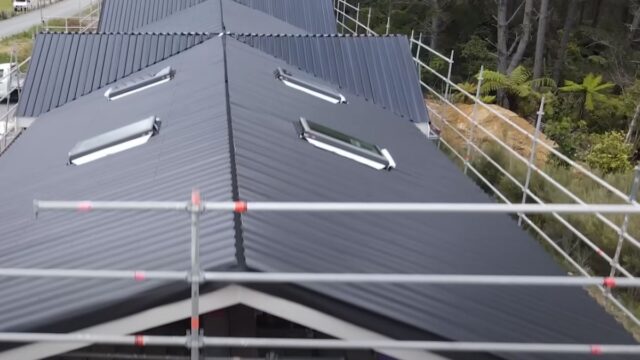Choosing the Right Materials for Reroofing
When it comes to re-roofing, the selection of materials is crucial, as it must complement the home’s architectural style, withstand Auckland’s unique climate, and align with the homeowner’s budget. From coastal homes in North Shore to the contemporary residences in Ponsonby, the roofing requirements might vary significantly.
Types of Reroofing Materials and Cost in Auckland
Asphalt Shingles
Asphalt shingles are a popular choice due to their affordability and versatility. They typically cost between NZD 30-60 per square metre and are suitable for various architectural styles.
Metal Roofing
For a more modern appearance, metal roofing might be the way to go. Suitable for various suburbs like Parnell, metal roofs offer durability and style. Expect to pay NZD 50-150 per square metre for this material.
Concrete Tiles
Popular in Auckland’s suburban areas like Howick, concrete tiles provide a classic look with robust resistance to weather conditions. The cost ranges between NZD 60-100 per square metre.
Wooden Shingles
If a natural look is desired, wooden shingles provide aesthetic appeal and environment-friendly aspects. They cost around NZD 80-200 per square metre.
Environmental Considerations for Reroofing
Sustainability and environmental concerns are becoming increasingly relevant. Options like recycled metal roofing or using reclaimed wood for shingles cater to the eco-conscious Aucklander. These materials not only look good but reduce the overall environmental impact of the reroofing project.
Health and Safety Requirements in Auckland
Safety is paramount when undertaking a reroofing project. Auckland roofers must comply with New Zealand’s strict safety standards, including proper scaffolding, fall protection, and site security. Homeowners should ensure their chosen contractor follows these regulations to prevent potential risks and liabilities.
Auckland Council Bylaw Considerations
Compliance with local bylaws is essential, and Auckland has specific rules governing roofing projects. Regional councils might have particular codes related to material usage, stormwater management, or aesthetic guidelines. It is recommended to consult with professional Auckland roofers familiar with the bylaws of specific suburbs like Remuera or Mt Eden.
Cost Considerations for Reroofing Auckland
While pricing for reroofing materials is essential, additional costs like labour, underlayment, and potential repairs must be considered. The overall price may vary based on the material selected, roof’s complexity, and the chosen roofing contractor.
Conclusion: Making the Right Choice
Whether it’s a new roof, roof restoration, or roof replacement, understanding the reroofing options available in Auckland is crucial. From selecting the right materials to understanding health and safety requirements, the journey to a new roof can be complex. By considering the unique factors that impact different Auckland suburbs and taking into account both cost and environmental factors, homeowners can make an informed decision tailored to their needs.
Frequently Asked Questions
What are the Different Types of Materials Available for Reroofing in Auckland?
Different materials for reroofing include asphalt shingles, metal roofing, concrete tiles, and wooden shingles. Each of these has its unique cost, appearance, and suitability for various architectural styles and locations within Auckland.
How Much Does Reroofing Typically Cost in Auckland?
The cost of reroofing in Auckland varies based on the material chosen and the complexity of the roof. Generally, prices can range from NZD 30 per square metre for asphalt shingles up to NZD 200 per square metre for wooden shingles. Additional costs for labour and potential repairs should also be considered.
Are There Any Auckland Council Bylaws I Should Be Aware of When Reroofing?
Yes, Auckland Council has specific bylaws that govern roofing projects, including rules related to material usage, stormwater management, and aesthetic guidelines. Different suburbs like Remuera or Mt Eden may have particular requirements, so it’s essential to consult with professional Auckland roofers who are familiar with these bylaws.
How Can I Make My Reroofing Project More Environmentally Friendly?
Choosing environmentally friendly materials like recycled metal roofing or reclaimed wooden shingles can make your reroofing project more sustainable. Working with roofers who are committed to sustainable practices and consulting with them about eco-friendly roofing options can further enhance your project’s environmental impact.
What Health and Safety Requirements Must Be Followed for Reroofing in Auckland?
New Zealand’s strict safety standards govern reroofing in Auckland, including rules on proper scaffolding, fall protection, and site security. Ensure that your roofing contractor complies with these regulations to prevent potential risks and liabilities.
Can I Use the Same Material for Reroofing as My Current Roof?
While you may choose to use the same material, the decision should consider factors like the condition of the current material, local bylaws, environmental considerations, and the overall look you desire for your home. Consulting with a roofing contractor can help you make an informed choice.
How Do I Choose the Right Material for Reroofing Based on My Auckland Suburb?
The choice of reroofing material can depend on your specific Auckland suburb, taking into account the local weather conditions, architectural styles, and even council bylaws. Engaging a local expert who understands these unique factors will help you select the best material for your home’s location and design.
References
- New Zealand Building Code – Roofing regulations and standards.
- Auckland Council Bylaws – Specific requirements for building and reroofing in various Auckland suburbs.
- “Sustainable Roofing Materials: An Overview” – Journal of Architectural Engineering, discussing the environmental impact of various roofing materials.
- Health and Safety at Work Act 2015 – Regulations concerning safe working practices in the construction industry.
